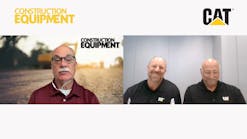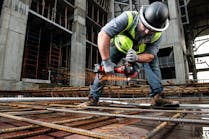Roach Concrete, Inc. is an agile, 30-person company that prides itself on providing on-time service, total customer satisfaction, and continuous growth and expansion of its capabilities.
Although relatively small, Roach has handled some sizeable pours and projects over its 21-year history, including placing 45,000 square feet of concrete in a 10-hour continuous pour; placing nearly 19,000 square feet of concrete in a pour on a day whose high temperature was 36 degrees; constructing a 3.6-million-pound wall that stands 23 feet high, up to 4 feet thick and 380 feet long in Delafield; and most recently constructing the foundations for ten buildings at the new ethanol plant in Milton, Wis.
Those kinds of achievements come from Roach's experience, its commitment to staying on the leading edge of the industry and the capabilities of its skilled employees.
Nestled on Highway 18 in the south-central Wisconsin town of Helenville, six miles east of Jefferson, Roach Concrete can conveniently serve Milwaukee, Madison, Janesville, and the rest of southern Wisconsin.
Though southern Wisconsin is its primary market, Roach will consider working just about anywhere if the project and payoff match its capabilities and business model. The company has worked as far north as Tomah in northern Wisconsin, and has also done projects in Illinois and Iowa.
As Estimator and Project Manager Rick Schleis says, "We will gladly consider projects outside of our normal geographic and price ranges if they would be beneficial both to us and the customer."
Currently, Roach's typical projects require placement of between 20,000 square feet and 150,000 square feet of concrete, and range in value from $5,000 to $500,000, with an average of about $300,000 and highs of over $1 million.
One of Roach's more high-profile recent projects was constructing the foundations and floors for 10 buildings that make up the majority of the recently completed ethanol production plant in Milton, Wis.
According to Roach representatives, the job was especially interesting because it was done on a fast track, with the designer's engineers on-site making changes to plans up to several times per day. The challenge of tracking and responding to the on-the-fly changes kept the job interesting — and kept a two-person crew busy daily for a year. The project also kept a larger crew busy when large pours were needed.
Responding to challenges has enabled the company to grow significantly since 1986, when Michael Roach founded it as a one-man operation. Back then, he was the whole company, and his principal business was swinging a pickaxe and handling a shovel to tear out sidewalks.
Today, the company staff includes a number of workers with specialized skills and experience, and it handles complex concrete projects from start to finish using advanced forming systems, laser screeds, power trowels, and other specialized equipment.
One thing hasn't changed, though. Mike Roach still is a hands-on leader who works on the projects with the rest of the crew. That kind of direct experience keeps him in touch with the realities and challenges of projects.
As Mike himself says, "To provide customers with the best value for their investment, we have to be aware of new options in products and technology, and also be knowledgeable and skilled in working with those technologies and techniques."
Roach Concrete's success also depends on having a bright, motivated "family" of employees who keep up with the latest in trends, materials and technology. Says Roach, "Although I have no family members working in this company, all of the employees and I feel as though we are one big family. That attitude helps get things done effectively.
"If we help customers profit and grow, our business will also continue to grow," he says.
Over the years, that attitude has enabled Roach to expand from primarily doing standard flatwork to being able to successfully work on large continuous-pour flatwork, low-temperature placement, walls, colored flooring, tilt-up construction, and most recently insulating concrete forms (ICFs) that reduce construction time and make buildings more energy efficient.
New Building Technology Offers Exciting OptionsJeff Trepanier, operations manager, says, "Insulating concrete forms are an amazing advancement in concrete construction. The two side walls of insulation and their connecting diaphragms are the concrete forms during construction, then remain in place to provide outstanding insulation after the structure is completed."
Schleis noted that the insulating value of this cement-between-foam sandwich can be as high as R-60, and typically ranges from about R-28 to R-30. He says that's nearly three times the R-11 provided by a 3-1/2-inch-thick wall filled with conventional insulation.
Besides energy efficiency, says Trepanier, the ICF offers many other benefits. One is comfort, because the building's temperature remains more consistent from spot to spot, and also remains even throughout the day and night.
He also says that they transmit only about one-sixth the sound of an ordinary frame wall, so occupants hear less outside noise intruding.
A third advantage, according to Trepanier, is design flexibility, as the building can be completed with almost any interior and exterior finishes and can take any shape as easily as a wood-frame building. In fact, he says, some interesting architectural effects, such as curved walls, can be less expensive to build into an ICF structure.
One final advantage is strength or solidity, says Trepanier. The strength of reinforced concrete construction with stands high winds and tornadoes far better than wood-frame homes. As an example, he cites an ICF house he saw in southern Wisconsin that survived a tornado which demolished the rest of the neighborhood. "What is that kind of security worth if you live in an area that experiences tornadoes frequently?" he asks.
Estimator and Project Manager Rick Schleis says that due to labor savings, ease of assembly and speed of construction with experienced crews, ICF buildings can cost only slightly more than stick-builts. That slight additional initial cost, he says, is quickly erased by the lower operating and maintenance costs of the ICF building.
ICF construction is one of the new technologies in which Roach Concrete has rapidly built leading expertise.
Says Mike Roach, "ICF construction is another leading-edge option we can offer customers. It's not the solution for everyone, but it will eventually prove to be the answer for a great many construction needs.
"Again," he said, "Roach strives to excel at providing customers with the best solution for their project, executed with quality, delivered on schedule and within budget. If the best solution is conventional, that's great. And if it's leading-edge, that's great, too. It's all about meeting the customer's needs."




